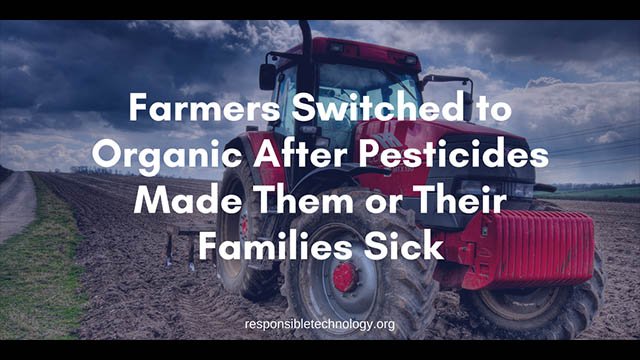Originally published in EcoWatch by Ken Roseboro
Some farmers transition to organic production to earn premium prices paid for organic crops. Others switch to make their farms more sustainable. But for some farmers transitioning to organic is a necessity to save their health—and even their lives.
Blaine Schmaltz, who farms in Rugby, North Dakota, is a good example. One day in September 1993, Schmaltz was spraying an herbicide on his field. He stopped to check the level in the sprayer tank. Looking inside, he started to feel lame and then passed out. He was later hospitalized for several months with asthma, muscle aches and pains, and insomnia. A doctor diagnosed him as having “occupational asthma.”
“The doctor told me to leave agriculture,” Schmaltz said. “He said, ‘if you don’t you probably won’t live 10 years.'”
While recovering, Schmaltz read about organic farming and decided to transition because he wanted to continue farming. The next spring he started the transition, and over time found it was the right choice. His symptoms disappeared.
Schmaltz continues to farm organically, growing wheat, edible beans, flax and other specialty grains.
“I didn’t switch to organic farming for the money or a utopian dream,” he said. “I did it for myself and my family in order to stay in agriculture.”
“Common story for many farmers” …
Blaine Schmaltz’s experience is not uncommon. Other farmers in the U.S. and Canada have switched to organic because of a health crisis they had—or even the death of a family member—due to pesticide exposure.
“It’s definitely a common story for many farmers,” said Kate Mendenhall, director of the Organic Farmers Association, about farmers wanting to go organic because of concerns with pesticides.
Mendenhall’s master’s degree thesis at Goddard College involved interviewing farmers worldwide who transitioned to organic, and she found that pesticides were a major concern.
“That was a theme globally,” she said. “Farmers had problems with pesticides or were nervous about them and didn’t want them around their children. Some had prior health problems from pesticides.” A 2017 report by Oregon State University and organic certifier Oregon Tilth, Breaking New Ground: Farmer Perspectives on Organic Transition, found that 86 percent of farmers surveyed said that concerns about health was one of the main motivations for transitioning.
“My husband was slowly being poisoned” …
Klaas Martens also switched to organic because of bad reactions to pesticides. Martens, who farms in Penn Yan, New York, suffered headaches, nausea, and temporary paralysis of his right arm from exposure to 2,4-D herbicide and other chemicals.
Martens dreaded spraying pesticides. “I knew I would feel rotten for a month after,” he said.
His wife, Mary-Howell, would later write: “My husband was slowly being poisoned.”
In 1991, the Martens decided to transition to organic because, according to Mary-Howell, they hated what pesticides “might be doing to us, our family, our land, and our environment.”
The Martens have been farming organically ever since and operate Lakeview Organic Grain, which supplies organic feed, grains and seeds.
Saskatchewan farmer Gus Zelinski transitioned to organic after being hospitalized for pesticide poisoning. He inhaled the herbicide Buctril-M after it circulated into the air of his tractor cabin while he was spraying his field.
“I couldn’t get my breath; I was just about choking,” Zelinski said.
He was hospitalized for a week. “The doctor said I was lucky,” he said.
His wife Dolores said the incident led Gus to convert the farm to organic.
“We went with organic farming practices and didn’t look back. We decided that health was more important than our pocketbook and using chemicals.”
She said other farmers in their area weren’t as fortunate as Gus.
“There are a few farmers in our area who have passed on because of chemicals. But that’s not spoken about in farming communities.”
According to Dag Falck, organic program manager at Nature’s Path Foods, stories like Gus Zelinski’s are common.
“I can’t tell you how many times I heard that in my (organic) inspection career. There were lots of stories about older farmers getting seriously ill or prematurely dying (due to pesticide-related illnesses),” he said.
“I didn’t want my kids exposed to the chemicals” …


